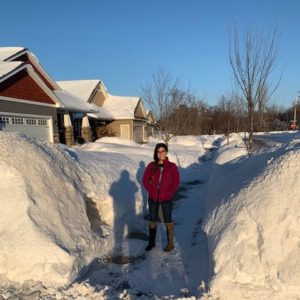Snow Shoveling Tips
 By Dr. Brittany Schmidt
By Dr. Brittany Schmidt
When we announced that we were moving to MN my dad said, “I hope you like shoveling snow.” Shoveling snow is just a part of life here in the Great North, but did you know that snow shoveling is notorious for causing injuries or even life threatening emergencies? I see it often in practice; when I ask a patient what is bothering them I’ll frequently hear, “I think I hurt my back shoveling snow,” or “I think I pulled my back out when I lifted the snow blower,” or “I slipped on the ice and hurt my back.” Shoveling snow or blowing snow can be hard work. In fact, it is actually pretty strenuous exercise, which can be problematic if one isn’t normally active.
Aside from common musculoskeletal injuries from shoveling, such as sprains or strains, there are also cardiovascular events that need to be considered. My husband is a paramedic and frequently attends 911 calls in the winter for chest pain and heart attacks that happen either during or just after shoveling snow. On a more personal note, sadly, my husband’s great uncle passed away last winter from a heart attack after shoveling snow. This happens more than one may think, in fact, it is estimated that about 100 people die each year in the US due to a cardiac event related to snow shoveling, and many more are admitted to the hospital for chest pain. Interestingly enough, a study was conducted that looked at a possible link between snow fall and cardiac events.
“Researchers correlated admissions to the hospital and deaths due to heart attack the day after it snowed in Canada during the years 1981 to 2014. This included more than 128,000 hospital admissions and more than 68,000 deaths due to heart attack. Here’s what they found:
- The deeper the snow, the more men were admitted for heart attacks. For example, for snowfalls of more than eight inches, there was a 16% increase in hospital admissions compared to days with no snow.
- The deeper the snow, the more men died of heart attacks. A 34% increase was observed the day after an eight-inch snowfall, and higher rates were noted when even more snow fell.
- Similar observations were made for duration of snowfall. The longer it snowed, the higher the rates of heart attack and related deaths among men.
- A link between snowfall and heart attack was not observed among women.”
-Robert Schmerling, MD
The study found that the correlation of heart attacks and snow fall were not only found in individuals with known cardiac disease but in individuals who had not previously been diagnosed with cardiac disease. The only pitfall of the study is that these individuals were not asked specifically if they had shoveled snow, so we can’t definitively say there is a correlation. It could be that it was simply coincidental or that there was another reason for their heart attack that day… say a car accident due to icy conditions or snow shoeing or skiing. Nonetheless, this data does seem to be telling.
Why would snow shoveling or blowing increase your risk of a heart attack? There may be several reasons including: being normally sedentary and then engaging in the strenuous activity of snow removal can be taxing– when it is cold out our blood vessels constrict as an effort to keep us warm—this can be troubling for the heart, and when one starts pushing a snow blower or shoveling, they may have a rapid increase of heart rate and blood pressure.
What are some tips for reducing your risk of injury or cardiac events?
- Talk to your doctor about shoveling snow if you have heart disease or heart problems
- Stay active! If you get in regular exercise shoveling snow may not be such a shock to your system
- Eat a healthy diet and avoid alcohol
- Stay hydrated!
- Stretch before you got out to shovel snow, warm up those muscles
- Get adjusted by a chiropractor after shoveling
- Wear layers and wear a hat or scarf to stay warm
- Take breaks! It is okay to pace yourself
- Choose an ergonomic and lighter shovel
- Push the snow instead of lifting it if possible
- Know the signs of a heart attack, if you have chest pain or feel short of breath stop and call 911, even if you are not sure it is better to call and be on the safe side
- Maybe consider hiring the neighborhood kid to help you out
- Take a family CPR class! Learning CPR saves lives!
Learn more about Dr. Brittany Schmidt here
Resources:
Can Shoveling Snow Put Your Heart At Risk? Robert Shmerling – https://www.health.harvard.edu/blog/can-shoveling-snow-put-your-heart-at-risk-2017120612887
Cold Weather and Cardiovascular Disease
http://www.heart.org/en/health-topics/consumer-healthcare/cold-weather-and-cardiovascular-disease
Snow Shoveling Safety Tips
https://www.travelers.com/resources/weather/winter-storms/snow-shoveling-tips
Image labeled for re-use
